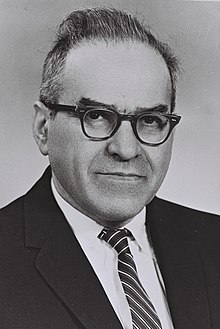The National Religious Party was a political party in Israel representing the religious Zionist movement.
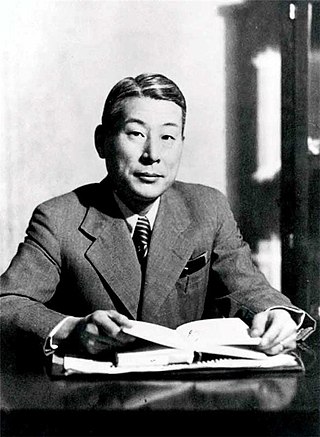
Chiune Sugihara was a Japanese diplomat who served as vice-consul for the Japanese Empire in Kaunas, Lithuania. During the Second World War, Sugihara helped thousands of Jews flee Europe by issuing transit visas to them so that they could travel through Japanese territory, risking his career and the lives of his family. The fleeing Jews were refugees from German-occupied Western Poland and Soviet-occupied Eastern Poland, as well as residents of Lithuania.
World Agudath Israel, usually known as the Aguda, was established in the early twentieth century as the political arm of Ashkenazi Torah Judaism. It succeeded Agudas Shlumei Emunei Yisroel in 1912. Its base of support was located in Eastern Europe before the Second World War but, due to the revival of the Hasidic movement, it included Orthodox Jews throughout Europe. Prior to World War II and the Holocaust, Agudath Israel operated a number of Jewish educational institutions throughout Europe. After the war, it has continued to operate such institutions in the United States as Agudath Israel of America, and in Israel. Agudath Israel is guided by its Moetzes Gedolei HaTorah in Israel and the USA.

Jan Zwartendijk was a Dutch businessman and diplomat. As director of the Philips factories in Lithuania and part-time acting consul of the Dutch government-in-exile, he supervised the writing of 2,345 visas for Curaçao to save Jews from the Holocaust during World War II. In 1997, Yad Vashem recognised him as Righteous Among the Nations.

Nahum Rakover, professor emeritus at Bar-Ilan University, is an Israeli former deputy attorney general. Rakover is a leading researcher in the application of traditional Jewish rabbinic law to Israel's state legal system.

Shlomo Yosef Burg was a German-born Israeli politician. In 1949, he was elected to the first Knesset, and served in many ministerial positions for the next 40 years. He was one of the founders of the National Religious Party.
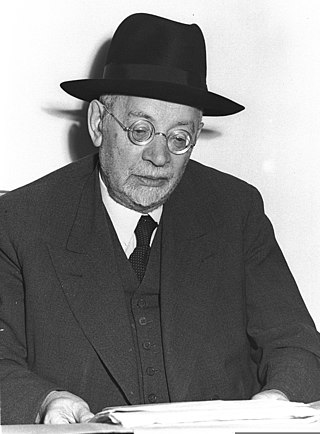
Yehuda Leib Maimon was an Israeli rabbi, politician and leader of the Religious Zionist movement. He was Israel's first Minister of Religions.
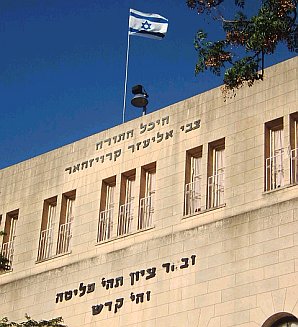
From the founding of political Zionism in the 1890s, Haredi Jewish leaders voiced objections to its secular orientation, and before the establishment of the State of Israel, the vast majority of Haredi Jews were opposed to Zionism, like early Reform Judaism, but with distinct reasoning. This was chiefly due to the concern that secular nationalism would redefine the Jewish nation from a religious community based in their alliance to God for whom adherence to religious laws were "the essence of the nation's task, purpose, and right to exists," to an ethnic group like any other as well as the view that it was forbidden for the Jews to re-constitute Jewish rule in the Land of Israel before the arrival of the Messiah. Those rabbis who did support Jewish resettlement in Palestine in the late 19th century had no intention to conquer Palestine and declare its independence from the rule of the Ottoman Turks, and some preferred that only observant Jews be allowed to settle there.
The United Religious Front was a political alliance of the four major religious parties in Israel, as well as the Union of Religious Independents, formed to contest the 1949 elections.
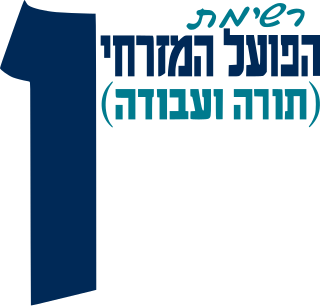
Hapoel HaMizrachi was a political party and settlement movement in Israel. It was one of the predecessors of the National Religious Party and the Jewish Home.
Poalei Agudat Yisrael was a trade union and Jewish political party in Poland and a minor political party in Israel. It was also known as PAI or PAGI, its Hebrew acronym.
Mizrachi was a political party in Israel, and is one of the ancestors of the modern-day National Religious Party–Religious Zionism.

Yitzchak Yaacov Reines, was a Lithuanian Orthodox rabbi and the founder of the Mizrachi Religious Zionist Movement, one of the earliest movements of Religious Zionism, as well as a correspondent of Theodor Herzl.

The third government of Israel was formed by David Ben-Gurion on 8 October 1951, more than two months after the elections. His Mapai party formed a coalition with Mizrachi, Hapoel HaMizrachi, Agudat Yisrael, Poalei Agudat Yisrael and the three Israeli Arab parties, the Democratic List for Israeli Arabs, Progress and Work and Agriculture and Development. There were 15 ministers.

Haim-Moshe Shapira was a key Israeli politician in the early days of the state's existence. A signatory of Israel's declaration of independence, he served continuously as a minister from the country's foundation in 1948 until his death in 1970 apart from a brief spell in the late 1950s.
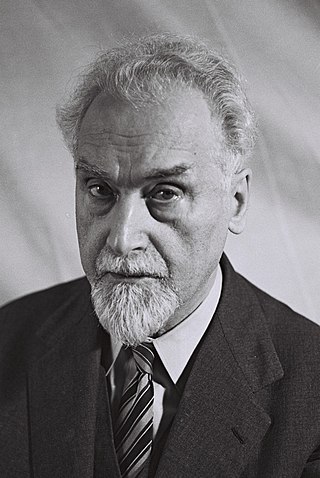
Mordechai Nurock was a Latvian-born Israeli who served in both the parliaments of Latvia and Israel. He was also Israel's first Minister of Postal Services, though he only held the post for less than two months.

Menachem Porush was an Israel politician who served as a member of the Knesset for Agudat Yisrael and its alliances between 1959 and 1975, and again from 1977 until 1994. He was known for his efforts to curb secularization in Israel, leading campaigns to enforce strict Jewish laws through legislation.

Tova Sanhadray-Goldreich was an Israeli politician who served as a member of the Knesset for the National Religious Party between 1959 and 1974.

The history of the Jews in Japan is well documented in modern times, with various traditions relating to much earlier eras.

Persona Non Grata is a 2015 Japanese biographical drama film directed by Cellin Gluck. It depicts the life of Japanese diplomat Chiune Sugihara who was appointed a vice-consul and later a consul in Lithuania and served there from 1939 to 1940 and who saved lives of some 6,000 Jewish refugees by issuing transit visas to the Japanese Empire.
